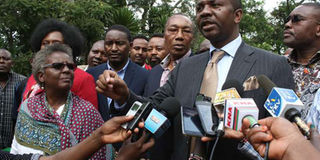Central leaders to renew war on illicit brew, mobilise voters

Central Kenya Parliamentary Group Chairman Dennis Waweru addresses a press conference after a two day meeting of leaders from Mt Kenya region, at Outspan hotel in Nyeri on February 19, 2016. Mr Waweru demanded that the IEBC gives additional BVR kits to the region. PHOTO | JOSEPH KANYI | NATION MEDIA GROUP
What you need to know:
- According to the leaders, there has been lack of civic awareness among voters on the importance of arming themselves with the voter’s card.
- Already, the IEBC has allocated 1,318 BVR kits to the 11 counties of central region. The BVR kits are meant to register new voters in the 6,024 registration centres in the region.
- Among the nine resolutions reached include the immediate closure of 115 alcohol manufacturing factories that have not complied with the inter-agency task force on control of illicit brews.
The two-day meeting convened by leaders from 11 counties in the central Kenya region ended on Friday with a resolution to launch a month-long campaign to register voters and to fight the illicit brew menace.
This comes as few Kenyans from the region come out to register due to lethargy over what is perceived as lack of implementation of projects by the Jubilee government.
Despite the hype, most MPs skipped the meeting. A Jubilee insider said the sponsors of the meeting, the Mt Kenya Foundation, an organisation which brings together central Kenya business leaders, are viewed with suspicion by some of the MPs.
The foundation raised Sh51 million to sponsor the event.
According to the leaders, there has been lack of civic awareness among voters on the importance of arming themselves with the voter’s card.
The leaders also cited lack of political mobilisation and admitted that their counterparts in Nyanza, Coast and Western regions have mobilised their people to register.
“Voter registration needs political mobilisation; this has been lacking and now we have rolled out a serious village-to-village campaign. There is an assumption that there is no urgency. Our people must know that a voter’s card is civic duty and a constitutional tool for self-governance,” said Mukurwe-ini legislator Kabando wa Kabando.
Gatundu South MP Moses Kuria said lack of implementation of projects has seen people shy away from political processes like voter registration.
“We only have 19 months and the petty squabbles between national and county governments that have hindered government must end if people across the country are to benefit,” he said.
Led by the Central Kenya Parliamentary Group Chairman Dennis Waweru and Devolution Cabinet Secretary Mwangi Kiunjuri, the leaders demanded that the Independent Electoral and Boundaries Commission gives additional BVR kits to the region.
Already, the IEBC has allocated 1,318 BVR kits to the 11 counties of central region. The BVR kits are meant to register new voters in the 6,024 registration centres in the region.
“The BVR kits have been unavailable and we demand that more units be taken even to all schools,” said part of the resolutions that were read by MCA Anthony Kiragu of Kiambu County.
FULFIL PROMISES
During the 2013 General Election, the region had the highest number of registered voters.
Kiambu County had 861,828 registered voters, followed by Murang’a which had 452,841 while Nyeri registered 356,380 voters.
Kirinyaga County registered 265,290 voters and Nyandarua had the least number of voters in the region with 255,984.
Among the nine resolutions reached include the immediate closure of 115 alcohol manufacturing factories that have not complied with the inter-agency task force on control of illicit brews.
The leaders asked the President to form a special police unit to fight the alcohol menace.
“We are calling for the formation of a special police unit to fight illicit brews and dangerous drugs. Illicit brew is a national disaster that is wiping out our young men faster than terrorism and conventional wars combined,” said Mr Kiunjuri.
Their resolve comes one week after the President issued orders to the leaders to resume the crackdown on the killer brews.
During the meeting, the leaders identified key areas in Alcoholic Drinks Control Act (2010), otherwise known as the Mututho Laws, which they termed obsolete and unconstitutional.
They said the law needs to be reviewed because it was drafted under the old Constitution when licensing of bars was under the national government.
Licensing is now a function of the counties.
The devolved units also have different laws on the number of bars needed per area and have different laws on rehabilitation as well as stiffer penalties for anyone found contravening the laws.
“We will lobby for amendments of various laws that deal with alcohol so that we eliminate hurdles that are exploited by illicit alcohol brewers. We also want stern action including summary dismissal t0 be meted out on national and county administrators in whose jurisdiction illicit brews are found,” said Mr Waweru, the Dagoretti South MP.
WORRIED LEADERS
Mr Waweru added that they would launch a one-month anti-alcohol campaign in the region starting next week.
In attendance were governors, senators, MPs, MCAs, and county assembly speakers. The meeting also attracted business people and religious leaders from central Kenya.
Meanwhile Chuka/Igamba-Ng’ombe sub-county Independent Electoral and Boundaries Commission registrar is targeting worship centres to improve voter registration.
Mr Arnold Mutwiri said there was a low turnout at the registration centres hence the need to employ measures to reach more voters.
“We will be visiting all mosques and churches to ensure that all eligible people are registered,” said Mr Mutwiri. “People need to know that each vote counts in determining the future leadership of our country.”
Recently, Chuka/Igamba-Ng’ombe MP Muthomi Njuki said more than 15,000 eligible voters were not registered in the constituencies.
A low turnout has been recorded in many parts of Tharaka-Nithi county since the mass voter registration was rolled out last Monday.
Additional reporting by Alex Njeru





